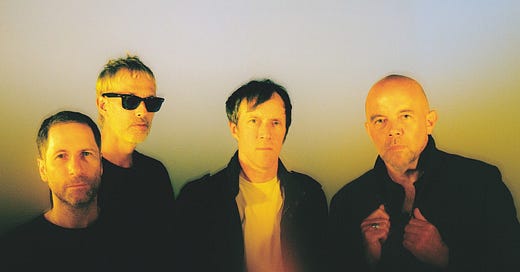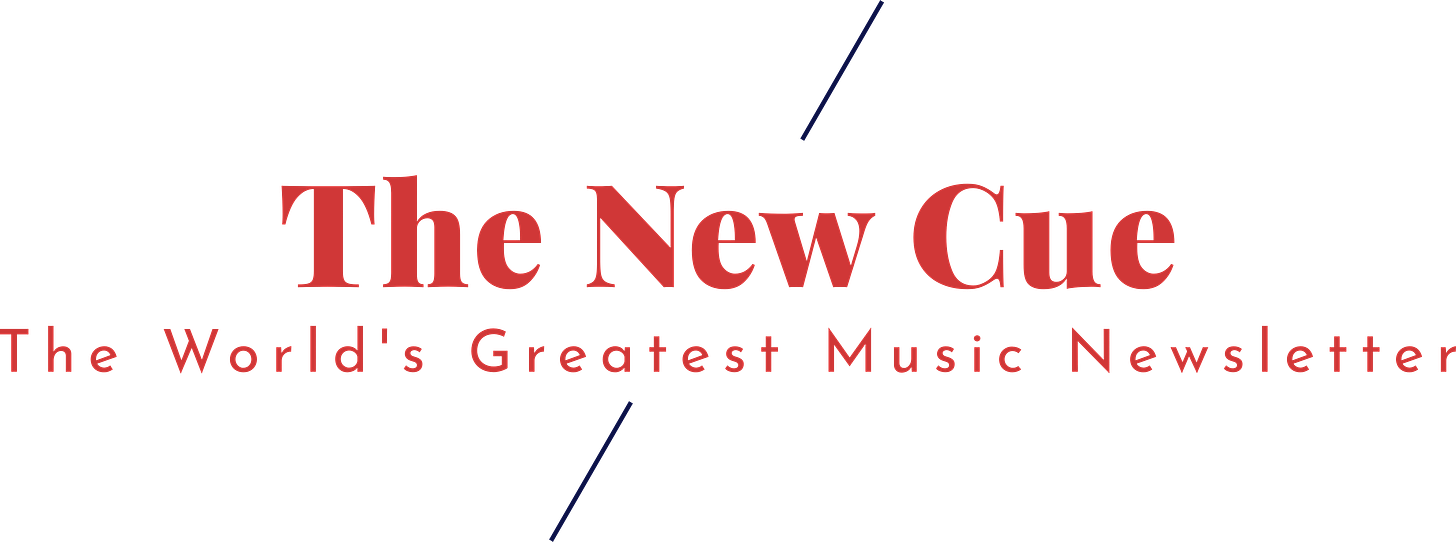The New Cue #359 February 19: Ride's Mark Gardener & Andy Bell
"We’ve been given a second chance to finish the band’s story..."
Good morning!
In today’s edition, we’ve got a little chinwag with Andy Bell and Mark Gardener of Ride all about their new album Interplay. It’s a free edition because we give the paywall every Monday off so go ahead all you non-paying-subscribers, get stuck in, our treat. We’ll be back on Friday for our usual Recommender capers.
Enjoy the edition, and if you do, why not click the share button below, spread the word, make us feel loved,
Ted, Niall and Chris
Start The Week With… Ride
Next month, Ride release their excellent seventh record Interplay. It’s the shoegazing trailblazers’ third album since reforming in 2014, a period in which they have refused to simply revel in past glories (although there has been some of that) and have made up for the way their original incarnation limped to an end in 1996 by injecting new music with the forward-thinking dynamic bursts that made them so exciting when they emerged in the late 80s. With its widescreen sonics and songs that take in anthemic rock’n’roll, electronic soundscapes, psych-folk and more, Interplay is the sound of a band in tip-top creative condition. But, as co-vocalists and guitarists Mark Gardener and Andy Bell reveal below, its creation was anything but breezy. Ride had to dig in but they’ve emerged with their best record in years. The pair told Niall all about it over Zoom a few weeks ago…
Hello both. Congratulations on the new record.
Mark Gardener: Thank you. It’s quite odd for me to now think about other people hearing it. I listened to a little bit of it today because I was mastering an instrumental track for the Japanese version and it did actually take me back to the early period of making it, pre-Richie Kennedy [producer] coming on board. At that point, I was doing the engineering, I was the guy with the studio. You think that’s amazing and then the reality of it is like, ‘Well, wait a minute, it’s quite hard to feel a part of the band when you’re trying to make sure that everything’s working and trying to wear too many hats’. I was even cooking and stuff.
I think the beauty of this record was that it was probably the first time the band had felt that we’d got our own home studio. I think for me, that was the root of all of it but at a certain point, I really just wanted to get back in the band and not be the guy at the console and engineering and all that.
If that’s how you felt at the start, how did you feel by the end?
MG: I felt good, I felt that we’d achieved something really great, certain tracks for me really surpassed stuff we’ve done before. Certain tracks were also a kind of therapy, a liberation from a dark period that preceded it, i.e the lockdown and also we were going through a whole horrible, ugly litigation thing with an old manager. It was definitely a triumph over a lot of adversity that had gone down. I think it could have almost threatened to end the band as well but we stuck at it, it wasn’t always easy at times but we came through and it came good. It was a tough period, for sure. Personally, I went through a separation as well. I had to stay in the studio because it was during the pandemic and I didn’t have a home for a while But the feeling at the end was that we’ve hit some real greatness across this record.
Andy Bell: For me, the biggest thing I’m proud of with the record is that it’s actually there, we actually managed to get a real album out of it. Because it was a long process this time, probably the longest time we spent making a record. I think that’s probably quite typical of many bands in the last few years who have been dealing with the pandemic.
What was the big breakthrough?
AB: The album really got going with a song called Last Night I Went Somewhere To Dream, which is [drummer] Loz’s track. It was an instrumental with a title and the title fit really well over the melody of the thing he’d written so it wasn’t exactly a hard thing to complete. I did the melody part, but it was kind of there already. It set up this really optimistic but wistful mood that that made me think of a lot of 80s pop that I really liked, stuff like Tears For Fears and Talk Talk. We all made a playlist of 80s stuff that we could pull on for references, songs like The Unforgettable Fire by U2, Life’s What You Make It, Everybody Wants To Rule The World. Although the band’s got roots in alternative music like The Cure and The Smiths and all those well-repeated bands that we listened to as kids, we’ve also got a shared history in the 80s pop stuff that we were getting into, that was just in the air. We all share that because we’re all the same age. It’s a different avenue of music. We all share these influences but maybe we didn’t know they were really there because you sort of discounted them. That music didn’t feel important that the time, it just felt like pop music but now when you hear back a song like Everybody Wants To Rule The World, it’s a classic record and I can give it its due in a way I couldn’t then.
Mark, when you allude to some songs being like therapy, which tracks?
MG: For me particularly, I Came To See The Wreck. Steve [Queralt, bassist] had the original music idea for it and he made a demo at home which reminded me of Boards Of Canada or something, I really connected with it. Not all the songs came like that - we did a lot of jamming and working - but with that track I had a few nights where candles were lit and it felt like a spiritual, therapeutic moment that I really went through and needed, it went somewhere else that song for me, like a combination of all the stuff that had gone on suddenly was released in a way, a sort of shamanic experience, if you will! Actually, at that time I did go to see a shaman as well to try and rid myself of old energy that I didn’t want to carry around with me anymore.
Also, it felt so good at last being in the studio and being able to have that time to work on things and have time to form things, be able to have those moments that were really transcendental, it felt like a transcendental sort of experience. Sometimes before, things were quite quick and that can be great as well, with albums before I almost felt like it had gone before I got really involved in it. With this one, we just had the time and the space to do it. I think everyone had different moments, I think Andy hit more of his thing when went went to Vada, the other studio, but for me it was definitely all about being in a place that was kind of home, which is this studio really not the same.
What do you think this record says about Ride in 2024?
AB: It says survival, it’s a survivor’s record. It shows the drive we have to keep going. Sometimes it’s not so much about pushing musical boundaries, it’s more just making a record. That was the victory.
With that in mind and the sometimes-arduous process you mentioned, as well as the litigation battle, would the 90s Ride have made it to the finish line on this record?
AB: I don’t think so. We’re painfully aware of the fact that we did implode in the mid 90s and I think that’s made us treat our second go round with real reverence and respect. It’s like a family at this point, there’s a lot of love there and there’s also a bit of dysfunction in there as well. But these are real long-term relationships we’ve all got with each other. I don’t think the 90s Ride would have finished this record because it would have been too tough, too immature, there’d have been points where I would have just thrown it in and said, ‘Nah, it’s not worth it.’ But we didn’t do that and that’s a testament to what we’ve learned along the way. The 90s Ride finished in a way that left our fans shortchanged because we made a slightly ambitious record and then not such a good record and that was the way that we bowed out - I’m talking about like Carnival Of Light and Tarantula. After starting off with two great ones, we made a slightly less great one and then a not very good one.
We’ve been given a second chance to finish the band’s story and we’re aware it’s an amazing privilege to have that. It’s given us an appreciation for what we do best together. And, you know, at the end of it in the middle of everything we do. Since we got back together, there is this flame of we all know what we do best. The title Interplay is intended to be some kind of illustration of that, it’s the interplay between the four of us that makes the band worth being in and worth being a part of.
MG: I like to think creatively that we’ve hit another new high. Obviously, there’s a big heritage angle to this band because loads of people were so in love with Nowhere and those early records but in a way for me the whole reformation coming back together was because I always felt that we still had great chemistry, great chemistry as a band. That was really why I wanted to do it was for moments that we felt in the studio like making this record and at times that we felt doing Weather Diaries and This Is Not A Safe Place. For me, it really vindicated it, because as we know, a lot of bands do come back together and it’s pretty awful after a big separation.
And the fact not just that the chemistry is still there, it’s evolved too.
MG: Exactly. I felt that, that it’s really evolved. Here there’s a lot of synths, which we’ve always mucked around with, and expanded the sound a bit. It’s that classic thing with guitar bands get older and they want to expand sounds with synths and stuff, and then you’ve got someone like Depeche Mode and they seem to be all about guitars now, the other way round for bands who were really know for synths. It was my dream to create a space like this studio, that you could be really creative in and where you could hit some really new heights and I think we’ve done it. It vindicates everything. Something happens when we get in a room like that together, which is bigger than the individuals every time.
ND




